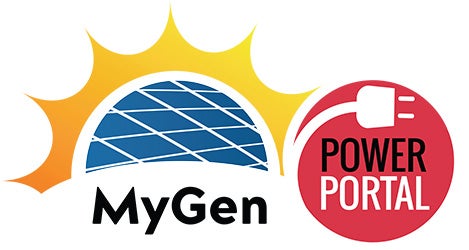MyGen through the Power Portal
MyGen offers United Power members with solar energy systems the convenience of viewing solar production data and energy consumption information in one online portal. With MyGen, you will not have to manually merge data provided by solar contractors with the net metering energy information from United Power to see your complete energy picture. Simply visit the Power Portal to monitor your solar production in the same place you gather your consumption history.
Paint Your Complete Energy Picture
MyGen allows members to view, graph, and download solar production and electric consumption data in one space. You can maximize your solar investment by tracking daily and hourly intervals of usage and production.
MyGen Program Details
- Access to energy consumption data in the Power Portal is free for United Power members
- Activate MyGen to view your solar production data in the Power Portal for $2/month
Before enrolling to the MyGen program:
If you have an analog meter, it will need to be upgraded to an advanced meter. In some cases, a meter housing to accommodate the advanced meter will need to be installed by an electrician.
How to Enroll in MyGen
To enroll in MyGen, complete the application found inside United Power's online member account management tool.
Complete the MyGen Application:
- Log in to your online account
- Click Report an Issue from the left menu
- Select MyGen Application – Net Metering from the drop-down list
- Complete the application and click Send to submit
Once enrolled, MyGen will be visible inside the Power Portal.
By submitting the enrollment form, you authorize United Power to enroll you in the MyGen Program. You understand program enrollment may require a meter exchange. Each month, you will be billed $2 for the presentment of your solar production data in the online energy portal, Power Portal. After enrollment, you will remain enrolled until you notify United Power at this email with your intent to discontinue participation.
Frequently Asked Questions
MyGen gives you insights into your solar system. You can view in-depth energy production data in 15-minute intervals to have greater insight into your energy generation. You can use this data to monitor your solar system, compare against energy usage, troubleshoot high bills, track the impact of a change in solar generation and evaluate the effect of energy-related investments.
To compare your solar generation to your metered usage, navigate to Advanced Controls at the bottom of the Usage Dashboard under the My Consumption Data tab in the top left of the page.
Within the Lower Chart View (bottom right), select Generation from the drop-down menu to display your solar production below your usage graph.
You may notice differences in the readings at the MyGen production meter from those displayed on the solar inverter or dashboard your solar company provides. This is typically due to differences in the timeframe of the data being measured and any losses between the inverter and the meter.
By subscribing to MyGen, you can view metered generation from your solar system and use this information to troubleshoot with your solar installer.

